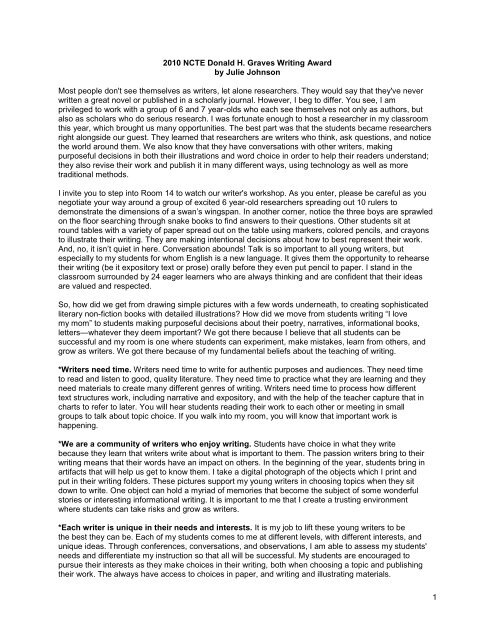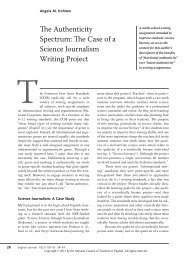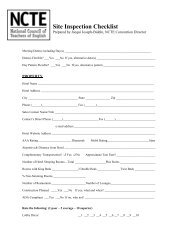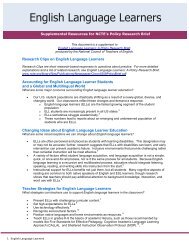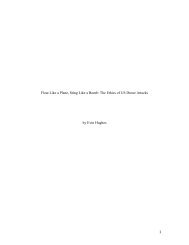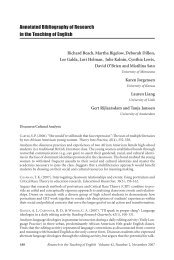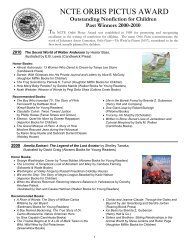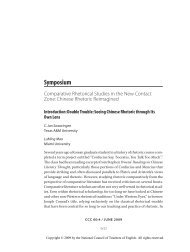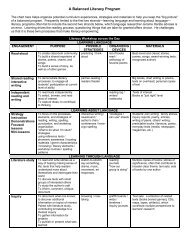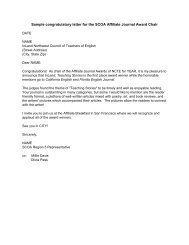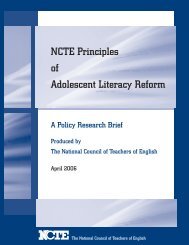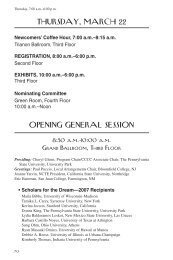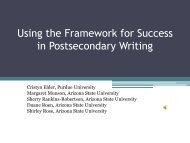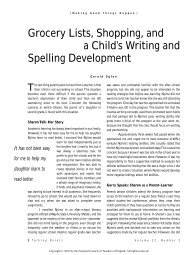Reflective Essay
Reflective Essay
Reflective Essay
- No tags were found...
Create successful ePaper yourself
Turn your PDF publications into a flip-book with our unique Google optimized e-Paper software.
2010 NCTE Donald H. Graves Writing Awardby Julie JohnsonMost people don't see themselves as writers, let alone researchers. They would say that they've neverwritten a great novel or published in a scholarly journal. However, I beg to differ. You see, I amprivileged to work with a group of 6 and 7 year-olds who each see themselves not only as authors, butalso as scholars who do serious research. I was fortunate enough to host a researcher in my classroomthis year, which brought us many opportunities. The best part was that the students became researchersright alongside our guest. They learned that researchers are writers who think, ask questions, and noticethe world around them. We also know that they have conversations with other writers, makingpurposeful decisions in both their illustrations and word choice in order to help their readers understand;they also revise their work and publish it in many different ways, using technology as well as moretraditional methods.I invite you to step into Room 14 to watch our writer's workshop. As you enter, please be careful as younegotiate your way around a group of excited 6 year-old researchers spreading out 10 rulers todemonstrate the dimensions of a swan’s wingspan. In another corner, notice the three boys are sprawledon the floor searching through snake books to find answers to their questions. Other students sit atround tables with a variety of paper spread out on the table using markers, colored pencils, and crayonsto illustrate their writing. They are making intentional decisions about how to best represent their work.And, no, it isn’t quiet in here. Conversation abounds! Talk is so important to all young writers, butespecially to my students for whom English is a new language. It gives them the opportunity to rehearsetheir writing (be it expository text or prose) orally before they even put pencil to paper. I stand in theclassroom surrounded by 24 eager learners who are always thinking and are confident that their ideasare valued and respected.So, how did we get from drawing simple pictures with a few words underneath, to creating sophisticatedliterary non-fiction books with detailed illustrations? How did we move from students writing ―I lovemy mom‖ to students making purposeful decisions about their poetry, narratives, informational books,letters—whatever they deem important? We got there because I believe that all students can besuccessful and my room is one where students can experiment, make mistakes, learn from others, andgrow as writers. We got there because of my fundamental beliefs about the teaching of writing.*Writers need time. Writers need time to write for authentic purposes and audiences. They need timeto read and listen to good, quality literature. They need time to practice what they are learning and theyneed materials to create many different genres of writing. Writers need time to process how differenttext structures work, including narrative and expository, and with the help of the teacher capture that incharts to refer to later. You will hear students reading their work to each other or meeting in smallgroups to talk about topic choice. If you walk into my room, you will know that important work ishappening.*We are a community of writers who enjoy writing. Students have choice in what they writebecause they learn that writers write about what is important to them. The passion writers bring to theirwriting means that their words have an impact on others. In the beginning of the year, students bring inartifacts that will help us get to know them. I take a digital photograph of the objects which I print andput in their writing folders. These pictures support my young writers in choosing topics when they sitdown to write. One object can hold a myriad of memories that become the subject of some wonderfulstories or interesting informational writing. It is important to me that I create a trusting environmentwhere students can take risks and grow as writers.*Each writer is unique in their needs and interests. It is my job to lift these young writers to bethe best they can be. Each of my students comes to me at different levels, with different interests, andunique ideas. Through conferences, conversations, and observations, I am able to assess my students'needs and differentiate my instruction so that all will be successful. My students are encouraged topursue their interests as they make choices in their writing, both when choosing a topic and publishingtheir work. The always have access to choices in paper, and writing and illustrating materials.1
*My students are immersed in quality literature that includes both fiction and informational texts.When you step into my room you can’t help but notice that reading and writing are intertwined. Myclassroom library is filled with mentor tests that the children turn to independently. Exemplars ofquality writing in different genres by authors like Cynthia Rylant, Mo Willems, Steve Jenkins, NicolaDavies, and Time for Kids Early Readers are regarded as old friends by my students. We haveconversations about the difference between expository texts and literary nonfiction (also known ashybrid informational text). It is not uncommon to hear a child say, ―Hey, I’m going to make a bookabout all the different things pond animals eat like Steve Jenkins does in Move.‖ (Move is about thedifferent ways animals move). Or you might notice students discussing why they chose to use a diagraminstead of a comparison on their ―I Wonder‖ poster. As a writing teacher I have come to appreciate thequality of children’s literature available to young writers today. Children’s authors, recognizing theincreasing sophistication of children as readers and writers, are producing exceptional pieces of writingthat are worthy mentors for young authors. My students, reading such books with a critical eye, noticewhat authors do and how they make decisions for their own writing.* Writing is meaningful in all areas of the curriculum. After reading Nell Duke's research about thescarcity of informational texts in first grade (Duke, N.K. 2000. 3.6 minutes per day: The scarcity ofinformational texts in first grade.‖ Reading Research Quarterly, 35(2), 202–224) and after havingconversations with the doctoral student doing research in my classroom, I began to question the currentthinking that young children should focus only on personal narratives in writing workshop (Tower, C.2002. ―It’s a snake you guys!‖: The power of text characteristics on children’s responses to informationbooks. Research in the Teaching of English, 37, 55-88). Moreover, I also knew that many of my EnglishLanguage Learners didn't have the vocabulary to tell their stories in English. Focusing on informationaltexts was a natural extension to vocabulary development that we were already doing in the content areas.In addition, so much information can be gleaned through diagrams and illustrations which help emergentreaders be successful researchers. Hence, I began early in the year to weave informational writing intowriting workshop. I wanted to help my students begin to approximate the research skills they wouldneed to use when they were much older. We began by collecting ―I wonder...‖ questions at the sametime learning about the text features of expository texts. Students then moved to finding answers to theirquestions and keeping track of their thinking in Discovery Journals. These young researchers publishedtheir work in a variety of ways...posters, hybrid informational books, podcasts, and videos featuringinterviews of family members. Throughout this process, they made decisions about text structure andexpository text features that would best help their readers understand their information. At other times,my students write thank you letters to Miss Billie for the much needed glue sticks. Or they write abouttheir thinking after reading a story in Reading Workshop. And they continue to research as they writetheir observations about the tadpoles or mealworms in our classroom.*It is important to regularly assess student writers. I talk to students about their writing as they plan,draft, revise, share, and publish their work. After conferencing with students, I may decide to do aminilesson on how researchers can use sketches to show their learning, or how they might make notes atthe top of their paper to remember some details they want to add to help the reader get a picture in hismind, or how authors go back and get their writing ready for publishing. I respond to student writing inindividual conferences, small guided writing groups, and whole group mini-lessons. I think it’simportant to note that I am not the only teacher. The students also teach as they give each otherfeedback during peer conferences or share time.*Technology is important to the writing process. This year I challenged myself to incorporate more21st century literacies in my instruction. Our world is changing and I believe that giving my studentsopportunities to use technology gives them a firm foundation on which to build the skills they'll need forthe future. According to NCTE's policy brief statement, ―Effective instruction in 21st-century literaciestakes an integrated approach, helping students understand how to access, evaluate, synthesize, andcontribute to information.‖ My students used Pixie to illustrate their writing and record their voices.They also learned how to use iMovie with the help of our technology teacher and a lot of parentvolunteers to digitally publish their personal narratives. Based on this individual work, I then createdpodcasts that the students and parents could view both at school and at home. My students also took2
mini-camcorders and iPod Nanos home to interview their parents or grandparents for our oral historyproject. It was wonderful to see the students take on the role of a researcher; likewise it was amazing tosee the respect that was given to them by their parents and grandparents as they took part in theinterview. Technology afforded my students one more way to express their knowledge that wasengaging as well as purposeful. Throughout the year I used my blog(www.raisingreadersandwriters.com) to reflect on this use of technology in my classroom.*We celebrate our work. Authors are honored in Room 14. We celebrate in small ways and wecelebrate in big ways. Writing Workshop always ends in sharing. I may ask a student to share a ―gem‖in his writing. Another student might share something he tried based on our mini-lesson. Sitting in theauthor’s chair is a coveted position. But it doesn’t end there. We meet regularly with our kindergartenfriends to share the books we write and listen to the books they wrote. Parents are invited to schoolseveral times to celebrate their child’s accomplishments as writers. At our pond museum, parents andguests mingled among the authors as they read their informational books (Slimy Snails, FlutteringButterflies, Go Turtles, to name a few). Students proudly talked about the intentional decisions theymade as they showed their 3 page spreads, or the camouflage colors used for the snake so that it wouldblend in with its surroundings. Our final celebration was one that honored not only my students, buttheir families as well. Parents, grandparents, brothers, and sisters gathered during the last week ofschool to watch the DVD of our family oral history project. This beautiful DVD is a compilation ofeach child's illustration of the story being told (using textured papers and collage in the manner of EricCarle and Steve Jenkins), their voice recording that introduces the story, and the video clip of agrandparent or parent telling a story from the family’s past. It was an extraordinary end to a year oflearning about how powerful words are.The year has drawn to a close now. Have I planted the seeds to nurture life-long writers? I can onlystep back now and be amazed. The writers I am sending forward are confident that their words make adifference. Not only that, but they are beginning to understand at this young age what it means to be aresearcher. They know without a doubt that they are authors!3


